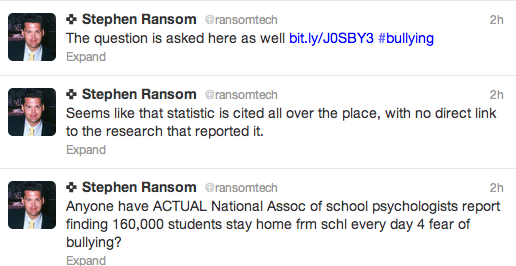Twitter: The great debunker
I learn something from every ten minute Twitter dose I allow myself. Our students can, too. This week Twitter is The Great Debunker.
Debunk 1: Find a debunking tool
Yesterday I saw an intriguing tweet about Million Short, a search engine that removes the first million, most popular results for your search terms (also can be set to remove 100, 1000, etc.) Why bother? In a world full of SEO (search engine optimization) pros, the sites with money and geeks-on-staff rise to the top of Google. In fact, they can clog the top. Google uses more than just popularity to generate results, so Million Short is not exactly Google Minus. No one knows precisely how Google’s algorithm decides the creme de la creme, but there are people who study it and do nothing but help web sites get there. (Full disclosure: Yes, TeachersFirst does our non-profit best to reach the pinnacle page of search results, too.) The idea of an anti-SEO search engine appeals to the defiant, creative side of me. Million Short just might reveal some lesser known treasures — as well as some real junk — that do not make it into the top million. Adding to the intrigue is the display of the sites that Million Short removed from the results and the ability to customize results using that list.
Million Short debunks Google’s ownership of what we should and should not see on the web. It also invites us to explore or debunk the sites that fall so far down the results. (Beyond a million!? That would be page 100,000+ of Google results at ten per page!). As a teacher, I want to challenge students to flip the Million Short results both ways:
- Look for reputable, valuable, creative but lesser-known sites that fall well below the bar but could perhaps bring something unexpected to our Google-mediated world. Are there any hidden treasures here, trapped by their lack of SEO expertise?
- Compare Million Short results to those at the pinnacle of Google. What is better about Google Goodness? Can you find evidence that these are more reputable, have less bias, are more up to date, etc?
Talk about a lesson in information literacy for the 21st century! Thanks, Twitter, for Infolit lesson #1.
Debunk 2: Tweet out your doubts
This morning, I saw a trio of tweets from @ransomtech (shown in reverse order):
Twitter sent me on a mission to help. A few moments later, I had thousands of search results all quoting from the same article, one without citation for the factoid in question in paragraph three. Then I found this and replied: 
Twitter did not actually do the debunking, but it gave @ransomtech a stream to send the tweet below within 30 minutes of his initial inquiry. In the process, Twitter shared a major debunk of an unattributed, oft-cited factoid:
Twitter could do the same for our students. Let them use a class account to tweet out their critical thinking and ask for help finding evidence. Thanks, Twitter, for Infolit lesson #2.





